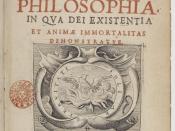Descartes' 'Cogito' is regarded by many as the birth of modern philosophy. Descartes was born in on the cusp of 17th century in 1596 after the high renaissance had literally rebirth-ed the worlds of the arts, politics and science. Philosophy was largely untainted by this worldwide upheaval initially as medieval scholasticism was still the dominant system studied and taught. Philosophy's renaissance from scholasticism was to come with Descartes and his contemporaries when the European world was reflecting and analysing the new discoveries and achievements that had settled themselves into society.
As a scientist, Descartes revolutionised geometry by solving geometrical problems by way of algebraic equations. He also wrote essays on optics, physics and meteorology. Descartes was part of a revolutionary breed of scientists and philosophers that subscribed to the now universally accepted view of a heliocentric Copernican model of the solar system. His early works on methodology were part of a wider movement to install the so-called Galilean World View as the wider accepted basis for science .
Through Descartes and Galileo physics came to be written in the language of mathematics and geometry instead of the previous order of scholasticism. The Aristotelian Scholastic concept of nisus was rejected in favour of looking at natural phenomenon in terms of a nature like a mechanical machine. Descartes interest in the project of establishing a method for this new advancing science is one of the core motivations towards his work in epistemology and why he was orientated towards the rationalistic view that knowledge should have mathematical certainty.
In the scholastic tradition Descartes reacted against it is assumed that the world is as we perceive it. Aristotelian-scholasticism explained phenomena in terms of qualities, causes and effects. Magnets attracting iron were explained in terms of the magnet having the quality of 'magnetism'. The...



Nicely written
This is going to help me out on my 15 page paper, thanks.
0 out of 0 people found this comment useful.